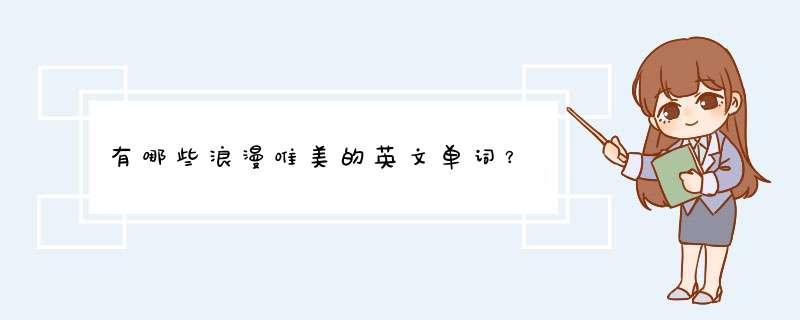
Epoch、Ineffable、Hiraeth、Petrichor、Serendipity等。
1、Epoch /'iːpɒk; 'epɒk/
历史或生命中的一段时刻
The Renaissance was an epoch of unparalleled cultural achievement
文艺复兴是一个文化上取得空前成就的时代。
2、Ineffable /ɪn'efəb(ə)l/
形容美到难以言喻
By virtue of something ineffable and melancholy which enveloped him, she felt the look in his eyes which she could not see
她看不见他的眼睛,却感到他的目光里有一种说不上来的忧伤把她裹住了。
3、Hiraeth /hɪəraɪ̯θ/
对于无法回去或不曾存在的家所产生的乡愁
近义词有longing(思念、渴望),nostalgia(乡愁、怀旧)。
4、Petrichor /ˈpɛtrɪkə/
雨下过以后,泥土的香味
释义:It refers to the distinctive scent which accompanies the first rain after a long warm dry spell
5、Serendipity /,ser(ə)n'dɪpɪtɪ/
意外发现有趣、新奇事物的天赋
Some of the best effects in my garden have been the result of serendipity
我花园里最珍贵的几件物品是机缘巧合之下意外所得。
“浪漫”的英文单词:
passion(越狱里苏克雷给GF写信,求浪漫词,米帅说:try passion)
whisper(sexy吧)
soul(I love you deep in my soul--take me to your heart )
breeze(only the breeze konws how much I miss you)
melody(unchined melody)
promise(won't come easy)
memory(we shared the sweetest memory)
rythm(of the rain)
sunshine(you are my sunshine)
rainbow(Isn't it beautiful)
浪漫(Romanticism)是开始于18世纪西欧的艺术、文学、和文化运动,大约就发生在1790年工业革命开始的前后。它注重以强烈的情感作为美学经验的来源,并且开始强调如不安、惊恐等情绪,以及人在遭遇到大自然的壮丽时表现出的敬畏。
浪漫主义是对于启蒙时代以来的贵族和专制政治文化的颠覆,以艺术和文学反抗对于自然的人为理性化。浪漫主义重视民间艺术、自然、以及传统,主张一个根基于自然的知识论,以自然的环境来解释人类的活动,包括了语言、传统、习俗。
浪漫主义受到了启蒙运动的理念影响,也吸收了中世纪文化复古的艺术成分。“浪漫”一词来自于“romance”—代表了源于中世纪文学和浪漫文学里颂扬英雄的诗赋风格。
欢迎分享,转载请注明来源:浪漫分享网

 微信扫一扫
微信扫一扫
 支付宝扫一扫
支付宝扫一扫
评论列表(0条)